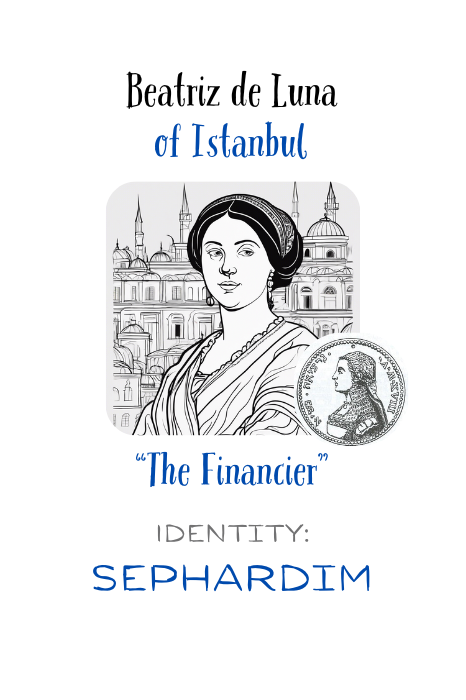
It’s time to introduce the first of the historical characters playable in FORTUNA, and without doubt one of the most interesting: Beatriz de Luna, also known as Beatrice Mendes or Doña Gracia Nasi. Born in Lisbon in around 1510, Beatriz would live in Antwerp, Venice, and Ferrara, before finally settling in Istanbul in the Ottoman Empire. As director of one of the biggest business concerns in Renaissance Europe, she was in regular contact with sultans, kings, and emperors, and even once threatened the Pope!
In the game, Beatriz’s identity is “Sephardim” (the other identities in the base game are Italian, Calvinist, Quaker, and Armenian). The economic importance of shared identities and diasporas in our period is sometimes a bit exaggerated, but it’s true that ‘community’ contacts abroad could be leveraged for information and capital. To represent this in the game, players with the same identity are able to check the cards they are being passed in a trade, rather than having to blindly trust their trading partner!
The Sephardim were a Jewish diaspora group whose roots lie in Spain and Portugal (the name comes from the Hebrew word Sepharad, meaning Iberia). In 1492, the King and Queen of Spain had expelled all Jews from their territories. Beatriz’s family escaped to Portugal, but they were eventually forced to convert to Catholicism and practice Judaism in secret. Families like hers were known as New Christians or conversos.
At the age of about 30, Beatriz’s husband and brother-in-law died in quick succession, and she was left in sole charge of a large trading empire dealing mostly in spices and silver. Her business interests took her first to one commercial metropolis, Antwerp, and then another, Venice, where she lived with her daughter in a house on the Grand Canal. After falling out with her sister, she moved to Ferrara, where she was a great patron of literary and scholarly activities. The “Ferrara Bible”, a Spanish translation of the Hebrew Bible, is dedicated to her and the Duke of Ferrara.
Finally, Beatriz moved to Istanbul where she was able to practice Judaism openly, the Ottoman Empire being much more tolerant than Christian Europe. She was granted land and used her wealth to support New Christiansescaping persecution. When the Pope persecuted some conversos in Ancona in 1556 (a city under his control at the time), she organized a trade boycott of the port in protest.
Like many of Europe’s wealthiest commercial players of all backgrounds, Beatriz and her sister Brianda lent money to rulers, including the Duke of Ferrara, the King of Spain, and the Holy Roman Emperor. Her nickname in FORTUNA is “The Financier”, granting the person playing Beatriz a special action. On her turn, Beatriz can choose to make a financial investment by discarding any number of commodity cards. On her next go, she can pick up any number of commodity cards from the market to the same value +1. So, she might discard a coffee and a wool card in one turn (3 value and 2 value respectively) and pick up a diamond card (6 value) in the next.
This gives the Beatriz player extra flexibility and the chance to grow their portfolio. As with all investments, however, capital is at risk. If the cards in the next market are not suitable or valuable enough, no refunds will be forthcoming. That’s fortune!




Leave a Reply